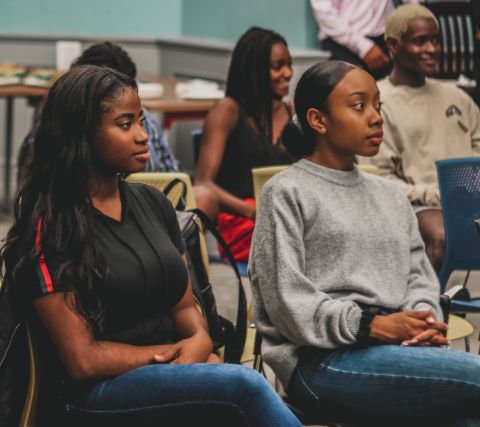
The Black Law Students’ Association – Queen’s Chapter (BLSA-Queen’s) has teamed up with two key campus groups to better support Black students at Queen’s Law.
BLSA-Queen’s, as part of a nationwide non-profit effort to build academic and professional opportunities for Black law students, has joined with the Queen’s Black Academic Society (QBAS), an undergraduate student group focused on advancing Black academics with attention to racial issues, education and equity.
The association has also partnered with the new Queen’s Black Alumni Chapter (QBAC), a branch of the Queen’s University Alumni Association, that connects Black alumni, students, and faculty members of Queen’s in the spirit of inclusivity and innovation.
BLSA-Queen’s President, Nigel Masenda, Law’20, cites the aim for more diversity in the Queen’s Law student body as a primary motivator for creating these new partnerships.
“Since coming to Queen’s, I’ve always loved the community,” admits Masenda. “Queen’s Law is a great atmosphere with an excellent faculty and many great resources for students. There is diversity at Queen’s, regardless of whether you can see or hear the many Queen’s students who hail from historically marginalized groups.”
In its annual demographic survey of the incoming class, the Faculty of Law continues to see a richly diverse group of talented students coming to Queen’s, with 37 per cent of the Class of Law’21 identifying as a member of a racialized group. “We want to promote a welcoming, inclusive message to all,” says Masenda.
By aligning with QBAS and QBAC, BLSA-Queen’s seeks to strengthen its community outreach and bolster its alumni relations efforts, respectively.
“Our whole premise is getting the BLSA name out there,” says Masenda. “Pooling our resources with QBAS assists us in promoting our message, hosting larger events and offering more opportunities to our members. Working with QBAC helps us connect current Black law students with alumni, who can impart professional wisdom and provide experiential learning opportunities so that students may put their best foot forward.”
While the BLSA-Queen’s alumni network may be small, Masenda touts its close-knit nature as beneficial in supporting Black students in their transition to professional practice. He says that these alumni are uniquely cognizant of the daily struggles and experiences that Black students face.
“What we lack in numbers at Queen’s, we gain in collegiality through the personal and professional connections we’re able to make,” emphasizes Masenda, adding that in law schools in larger cities, “You wouldn’t get those opportunities.”
Masenda seeks to keep the BLSA-Queens’ mentoring program application process as informal and accessible as possible. The group boasts a diverse range of members from many different ethnic backgrounds. Students can get involved in a multitude of ways, including but not limited to email, Facebook, or anonymously by contacting Helen Connop, Manager of Education & Equity Services at Queen’s Law.
“Regardless of whether you identify as marginalized or with a minority group, we will welcome you with open arms,” vows Masenda. “No one will ever know about your background and experiences unless you talk about them. We want to get to know each other as human beings and to foster greater harmony in our community. We see our alliances with QBAS and QBAC as promising first steps toward that goal.”
At a recent joint event organized by BLSA-Queen’s and QBAS, 20 students attended a “Pre-Law Information Session” devoted to the law school application process from a Black undergraduate perspective. Among the subjects discussed were LSAT study strategies, entrepreneurship, working on Bay Street, and post-graduate opportunities in law. The seminar, however, focused on helping Black students navigate the professional world without sacrificing what makes them unique.
“Don’t differ from what makes you great,” declared Masenda, speaking at the event. “Be proud of who you are, and be confident in your experiences. Don’t shy away from your minority status or change the name on your application. You, as a Black applicant, can distinguish yourself. By focusing on your unique interests and strengths, you can be the best professional version of yourself. Be comfortable with being different.”
For its part, QBAC will launch its inaugural event on October 20 in Kingston during Homecoming weekend. Here, the organization will unveil its flagship QBAC Mentorship Program, as well as give alumni the opportunity to network. It will also feature a panel discussion with four impressive guest speakers: Hazel Claxton, Com’83, retired Morneau Shepell EVP and chief human resources officer; Beau Sackey, MBA’12, managing partner of Biltstone Consulting; Curtis Carmichael, PHE’16, founder of Ride for Promise; and Jeanelle Dundas, ArtSci'13, a lawyer with Blake, Cassels & Graydon LLP. Students are encouraged to attend.
By Justin Murphy